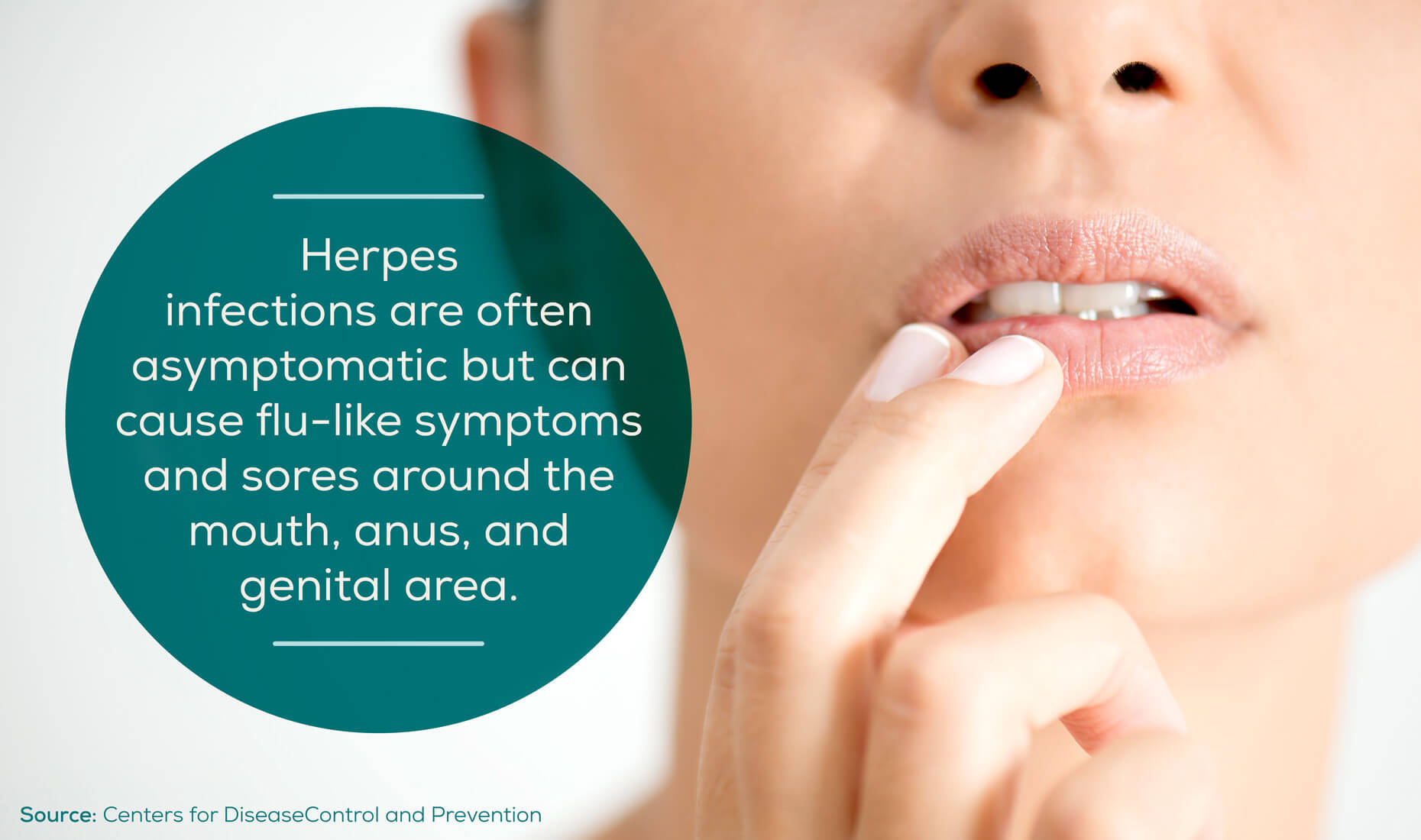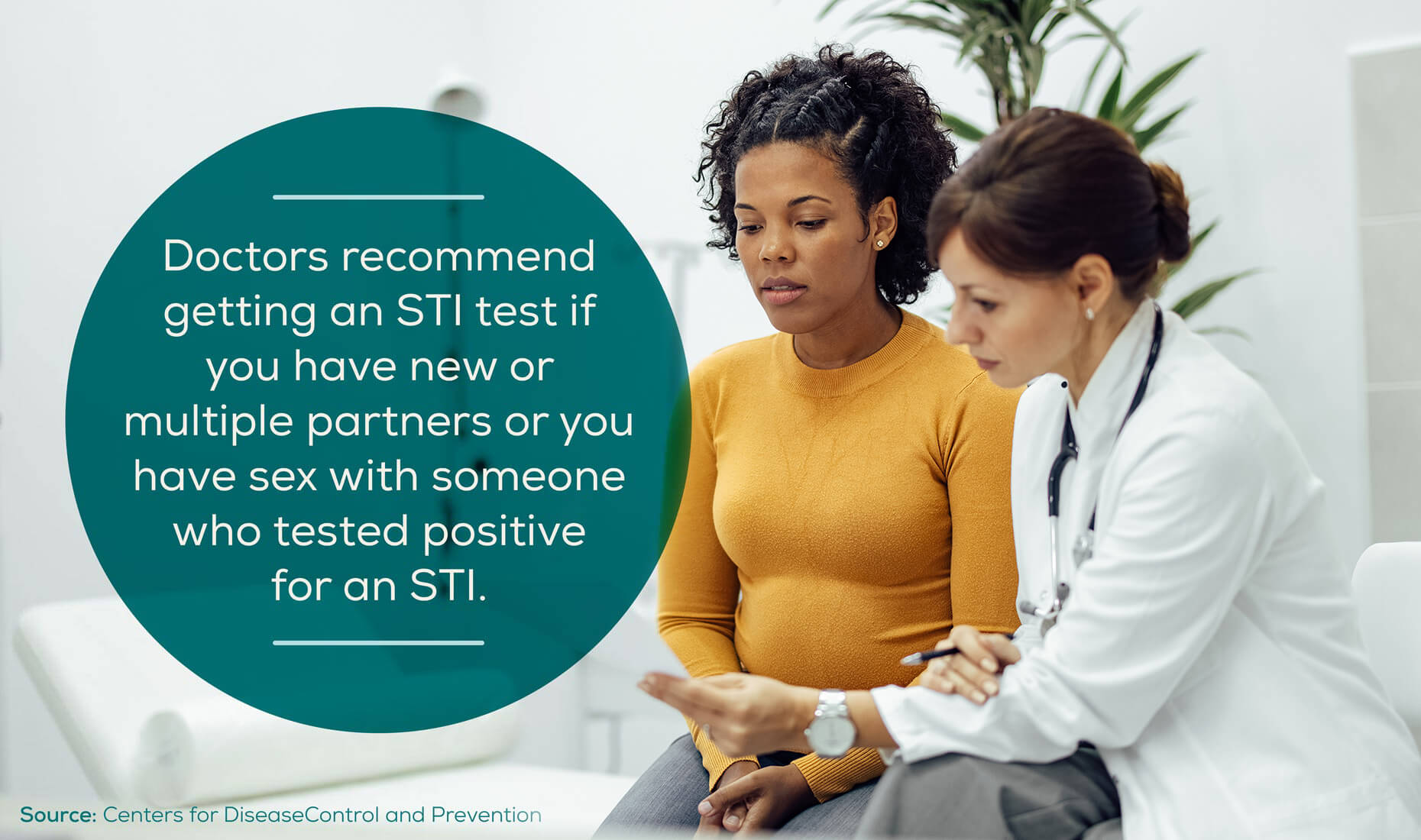
Living With Herpes: What You Need to Know About Dating and Treatment
Updated March 12, 2024. Medically reviewed on Oct 07, 2023 by Jillian Foglesong Stabile, MD, FAAFP. To give you technically accurate, evidence-based information, content published on the Everlywell blog is reviewed by credentialed professionals with expertise in medical and bioscience fields.
Table of contents
- How Common Is Herpes?
- The Basics of Living With Herpes: What to Expect, Treatment Options, and TYTY
- 3 Tips for Dating With Herpes
- Build Better Health at Home with Everlywell
Being diagnosed with herpes can bring up a lot of strong emotions. It’s normal to feel anxious or embarrassed at first, but the most helpful thing you can do if someone you know is diagnosed is to avoid casting blame—including if the person diagnosed is you.
If you’ve been diagnosed with herpes, know that you aren’t alone. Many myths, misconceptions, and stigmas surrounding herpes and other STIs can leave those affected feeling guilty, confused, and isolated. In some cases, these stigmas can even prevent people from seeking a diagnosis and proper care that could greatly improve their quality of life.
Getting the facts about herpes—as well as what dating with herpes looks like in practice—can be a profound act of protecting your and your partner’s physical and emotional health. By learning how to live with herpes and taking a proactive approach to your sexual health, you can reenter your life and the dating pool with clarity, confidence, and care.
How Common Is Herpes?
Herpes is a very common sexually transmitted infection. An estimated 50 to 80 percent of adults in the U.S. have oral herpes, and roughly 1 in 6 people ages 14 to 49 have genital herpes [1, 2]. Herpes simplex virus (HSV) is not deadly and rarely causes serious health problems. [3] While it isn’t curable, multiple treatment options are available to help manage outbreaks.
It’s important to recognize that a herpes infection can remain dormant for years, and many people unknowingly contract it even if they practice safe sex, use protection, and do everything “right.” People living with STIs are not “irresponsible” or “unfaithful.” If anything, learning the facts about HSV is a commendable step towards protecting your health and your partners’.
The Basics of Living With Herpes: What to Expect, Treatment Options, and TYTY
If you’ve been diagnosed with herpes, your healthcare provider may have informed you that there is currently no cure for the condition. However, there are some basics to be aware of that can help you manage your symptoms and cultivate a life you can thrive in.

Initial Outbreaks Are Typically The Hardest
Because herpes is often asymptomatic, some people don’t learn they have it until they undergo STI testing. Others experience what’s known as a first “outbreak,” which can present with symptoms like [4]:
- Sores around the genital area or rectum (genital herpes)
- Blisters or cold sores around the mouth (oral herpes)
- Flu-like symptoms such as fever, aches, and swollen glands
- Small bumps that resemble an ingrown hair or pimple (genital herpes)
Symptoms tend to vary between people, depending on which areas of your body are affected, as well as the herpes simplex virus type you have. There are two strains of the herpes virus to be aware of [5]:
- HSV-1, which is most commonly associated with oral herpes
- HSV-2, which is most commonly associated with genital herpes
If you’ve been diagnosed with HSV-2 with an initial outbreak, it’s more likely you’ll experience herpes recurrences later. [5] The good news is that these tend to be shorter and milder than your first outbreak. Over time, they’re also likely to become significantly less noticeable (though you’ll still need to manage your condition and inform your sexual partners). [5]
Herpes Isn’t Curable, But It Is Treatable
Many people mistake herpes’ incurability for an inability to treat the condition. Actually, it’s crucial for people with herpes to make treatment part of their everyday routine. Doing so can help minimize outbreaks, as well as protect their sexual partners.
Healthcare providers typically treat herpes with:
-
Oral antiviral medicine – If you have genital herpes caused by HSV-2, your doctor may prescribe an oral antiviral medication to treat a current herpes outbreak and prevent recurrent episodes [6]. These medications can’t cure HSV, but they can reduce genital herpes symptoms, shorten the duration of genital herpes outbreaks, and suppress the virus to help reduce the risk of spreading it to a sexual partner. [5] Most people take herpes medication episodically, for a period between 7 and 10 days. [6]
-
Topical ointments – If you have a cold sores caused by oral herpes, your doctor may also recommend taking topical ointments to help reduce them [1]. You can also buy over-the-counter painkillers, topical anti-inflammatory agents, or anesthetics to reduce pain and inflammation. [7]
It’s also important to consult with your healthcare provider about managing the condition even when you aren’t experiencing herpes symptoms. Additionally, you can utilize Everlywell's convenient telehealth options to explore oral herpes medication online. Lifestyle changes can significantly enhance your quality of life overall, in addition to promoting safe, healthy relationships with sexual partners.
Communicating with Partners Shows You Care
Because of the stigma surrounding herpes and other STIs, many people find it challenging or even shameful to disclose their status to partners. It takes courage to open up to a sexual partner—especially a new one—but doing so is essential in protecting both parties’ health.
Remember, herpes can be spread through [4]:
- Genital-to-genital contact
- Skin-to-skin contact
- Kissing or saliva exchange
- Touching a herpes sore
While herpes can’t be contracted by touching objects used by an infected person, it’s still highly transmissible. Though it can be difficult to communicate openly with new and old partners about your status, engaging in these discussions with your partners about living with genital herpes demonstrates a commitment to mutual health and respect, fostering a stronger, more informed connection.
Part of “Care” Includes Investing in Your Mental Health
All too often, healthcare is strictly associated with physical symptoms, diagnoses, or treatment plans. But whether you’re struggling to open up to a new partner or you’re feeling emotional about your diagnosis, being diagnosed with HSV can cause stress, fear, and other difficult feelings.Finding a mental health counselor can be a profound outlet for processing your feelings and overcoming any guilt, shame, or anxiety stemming from your herpes diagnosis. Additionally, joining an STI+ support group can help you identify, connect with, and learn from people going through the same experience. It’s a wonderful place to hear suggestions for living a full, vibrant life with a chronic health condition.
Making STI Testing A Part of Your Routine
If you’re sexually active, it’s important to develop a proactive attitude towards STI testing. People with herpes may be at a higher risk of contracting other STIs, like HIV. [8]
Nowadays, you can screen for STIs with a healthcare provider or wherever is convenient for you with an at-home STI test. Because STIs can be asymptomatic, early detection may reduce your risk of spreading them to partners or developing more severe herpes symptoms later on.
The CDC lists the following STI screening recommendations for sexually active adults [9]:
- Everyone ages 13 to 64 should get tested at least once for HIV.
- Anyone who has sex with new or multiple male partners should get tested once a year for syphilis, chlamydia, and gonorrhea.
- Everyone who is pregnant should get tested for syphilis, HIV, hepatitis B, and hepatitis C early in their pregnancy.
- People with new or multiple sex partners should get tested for HIV at least once a year.
3 Tips for Dating With Herpes

Receiving a herpes diagnosis can be nerve-wracking, but empowering yourself with knowledge can make navigating romance and dating much easier. Plenty of people with herpes have healthy sexual and romantic lives—but these suggestions can make for safer, more fulfilling relationships.
1. Be Honest With Your Partner
It’s important to navigate how to talk about STDs with your partner. Start by having an open and honest conversation about your diagnosis at the start of any new dating relationship. Doing so helps reduce your risk of spreading the virus, giving your partner time to process and adapt to the practicalities of dating a partner with herpes.
Understanding how to live with herpes and communicating this knowledge clearly can alleviate concerns, making it easier to navigate intimate relationships. Remember, it’s normal for your partner to ask a lot of questions after learning about your diagnosis. They might wonder when you were diagnosed, how you got it, and what their risks are. These questions can feel a little uncomfortable—especially if you’re newly diagnosed—but try to remember that your and your partner’s health are top priorities.
Ultimately, answering their questions as honestly as possible enables your partner to make an informed decision. It can also help you two brainstorm prevention strategies and start your relationship on a foundation of honesty, transparent communication, and intimacy.
2. Avoid Misinformation
Whether you’re learning about HSV yourself or discussing it with a partner, it’s important to seek out information from reliable sources. This can ensure you don’t inadvertently spread misinformation or misrepresent the risks of HSV.
Discussing your case of HSV with a healthcare provider should be your first stop after you’ve been diagnosed. They can help answer any questions you have about your diagnosis and may be able to provide educational materials for you and your partner. If you need help finding reliable information, you can also visit the CDC website to learn more about risks, symptoms, and treatment options.
3. Practice Safe Sex
If you’ve discussed the risks with your partner and decide to remain sexually active, there are steps you can take to reduce the risk of transmission. For people with oral herpes, it can be as simple as avoiding kissing and oral sex until any sores have completely healed.
People with genital herpes should take a few extra precautions before resuming sexual activity. Condoms and dental dams don’t completely eliminate the risk, but using them correctly every time you have sex can greatly reduce your chances of passing genital herpes on to a partner. Your doctor may also recommend taking a suppressive antiviral medication and avoiding sexual activity if you have an active outbreak. [5]
No matter which type of herpes you have, you should always ask your doctor about safe sex practices to protect yourself and your partner.
Build Better Health at Home with Everlywell
The best way to break the stigma surrounding herpes is to educate yourself about the virus and take an assertive approach to your sexual health. With Everlywell, you can test 6 common STIs from the comfort of home—discreetly, conveniently, and at an affordable cost.
All Everlywell tests are data-secured and reviewed by physicians. If your results indicate a need for further treatment, you’ll be connected to a care provider who can help you decide on the best course forward. Plus, with our virtual care services, you can even meet with a licensed clinician to receive genital herpes treatment online.
Explore STI testing and more at-home tests by visiting Everlywell today. You can opt for sexual health testing year-round through the Everlywell+ STI testing membership, giving you easy access to a wide of variety of STI test options.
Sources
- Oral Herpes. Johns Hopkins Medicine. Medical Citation URL. Accessed February 22, 2024.
- Genital Herpes. Johns Hopkins Medicine. Medical Citation URL. Accessed February 22, 2024.
- Living With Herpes | Common Questions and Answers. Planned Parenthood. Medical Citation URL. Accessed February 22, 2024.
- STD Facts - Genital Herpes. Medical Citation URL. Accessed February 22, 2024.
- Genital Herpes - Symptoms and Causes c. Mayo Clinic. Medical Citation URL. Accessed February 22, 2024.
- Herpes - STI Treatment Guidelines. CDC. Medical Citation URL. Accessed February 22, 2024.
- What to Do During a Genital Herpes Outbreak. Cleveland Clinic. Medical Citation URL. Accessed February 22, 2024.
- Detailed STD Facts - Genital Herpes. CDC. Medical Citation URL. Accessed February 22, 2024.
- Which STD Tests Should I Get? | Prevention | STDs. CDC. Medical Citation URL. Accessed February 22, 2024.
Jillian Foglesong Stabile, MD, FAAFP is a board-certified Family Physician. Since completing her residency training in 2010, she’s been practicing full-scope family medicine in a rural setting. Dr. Foglesong Stabile’s practice includes caring for patients of all ages for preventative care as well as chronic disease management. She also provides prenatal care and delivers babies. Dr. Foglesong Stabile completed a teaching fellowship in 2020 and teaches the family medicine clerkship for one of her local medical schools. Dr. Foglesong Stabile’s favorite thing about family medicine is the variety of patients she sees in her clinical practice.
